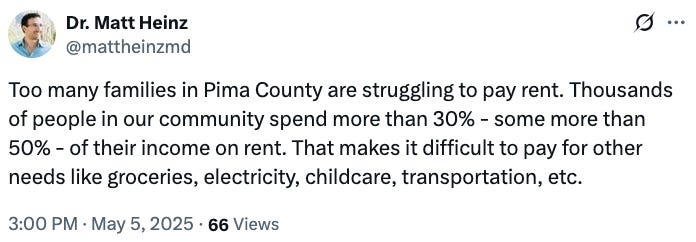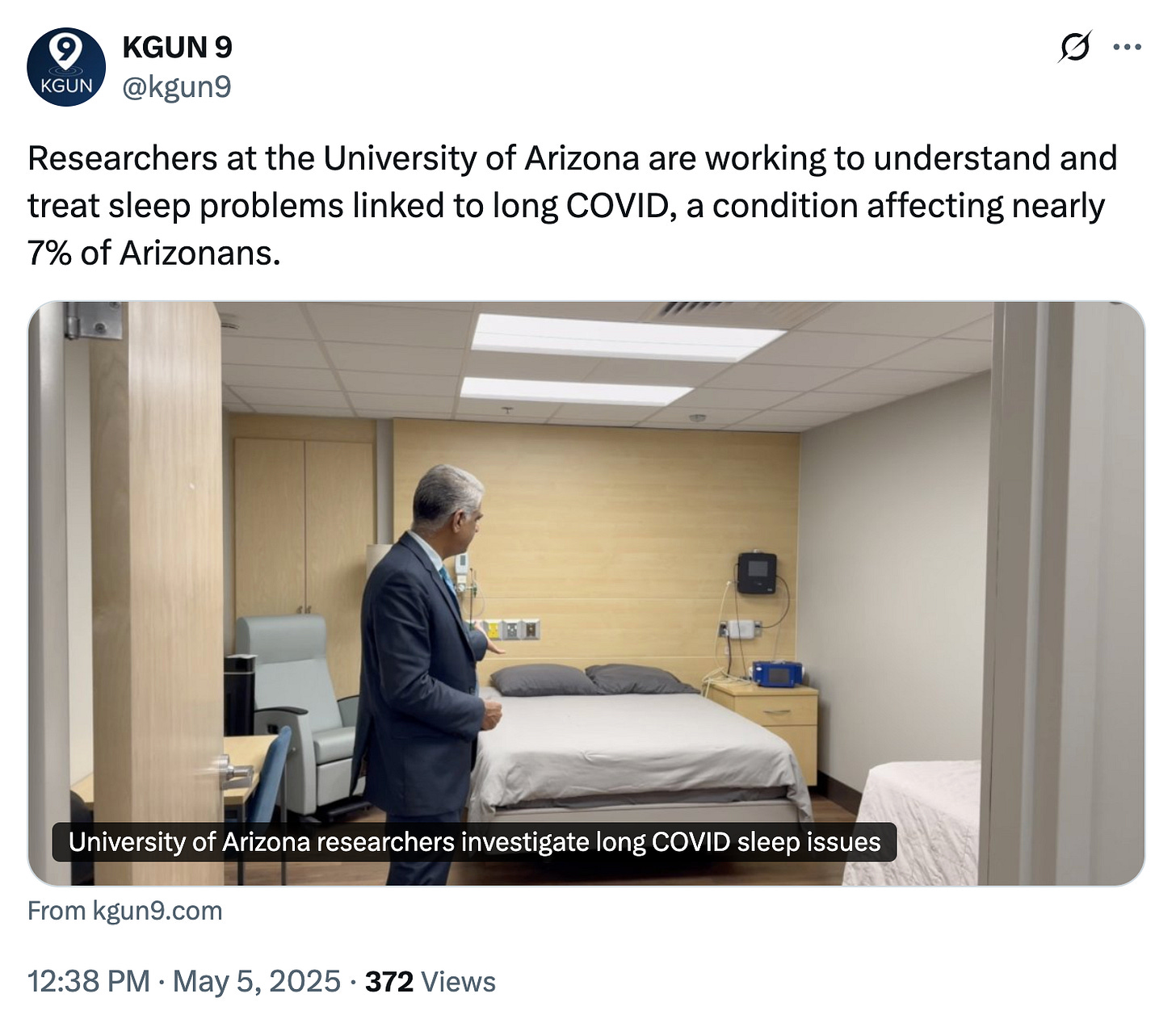The price of water
How will a new board vote? … Picking a good judge … And they grow into politicians so quickly!
Don’t blame the messenger, but the Pima County Board of Supervisors has an absurdly long meeting this morning — there are 70 items on the agenda!
Here are the three big items that are worth keeping an eye on today.
Another fight over water rates. A few weeks ago, the City of Tucson signaled it will again adopt a bifurcated water rate increase — meaning it’ll ask county residents to pay more for water than their neighbors in the city limits.
The last time the city and county went head-to-head over increased water rates for county residents, a Maricopa County judge ruled against the city, calling the plan unreasonable. Undeterred, Tucson is moving forward with a new increase.
We expect most of the supervisors to oppose the city’s plan, but the last vote by the supervisors was far from unanimous. In 2021, Supervisors Rex Scott, Sharon Bronson and Steve Christy voted in favor of suing Tucson, while then-Supervisors Matt Heinz and Adelita Grijalva dissented.
With Bronson and Grijalva gone, it will be interesting to see how Supervisors Andrés Cano and Jennifer Allen vote, as both of their districts cover large parts of Tucson, not just the county.
Three cents for affordable housing? The supervisors will resume discussion of Heinz’s 10-year plan to make a dent in the lack of affordable housing in Pima County by increasing property taxes by essentially 3 cents per year every year.
The cost for the average homeowner is about $7 in its first year. Heinz believes the plan will generate $207 million for housing, which in turn, would create 12,000 affordable units in the next decade.
Both the Regional Affordable Housing Commission and the city’s Commission on Equitable Housing & Development have signed letters of support for Heinz’s proposal.
We’d love to tell you more: The supervisors will also get informational updates on “Federal and State Executive, Legislative and Judicial Actions that affect Pima County” and “County Initiatives to Address Homelessness and Public Safety” today, but have posted no additional documents to preview this discussion.
Both are on the agenda every week and might be considered routine, but we’re still annoyed that the county chooses to meet the bare legal minimum in terms of telling the public about these actions. To be clear, these are informational updates and the supervisors will not be asked to vote on new initiatives, funding or legal action on these agenda items.
The Pima County Attorney’s Office did put two items on the executive session related to federal actions, but it is too early to tell what specific action the supervisors may take.
The Supervisors will also spend some time picking a new justice of the peace to fill the vacancy left by Alexander Ball. (He already stepped down, regardless of what the county website says.)
A total of five people have applied for the position:
Morgan Miholich, a deputy Pima County attorney
Steve Farley, former state legislator and former head of the Humane Society of Southern Arizona
Juan Francisco Padres, a teacher who challenged former Supervisor Sharon Bronson in 2020
John-Robert Wagner Granger Jr., a deputy Pima County attorney
David Peter Miller, a deputy Pima County attorney
While each has their strengths, we found the letters of support interesting. Both Miholich and Miller got glowing letters of support, while someone sent in hate mail about Farley's troubled tenure as the leader of the Humane Society of Southern Arizona. (Remember the episode about the 318 rabbits, guinea pigs, rats, mice and hamsters that were “re-homed,” seemingly to a snake’s belly?)
If you’re really interested in the candidates, this 122-page report has all the details.
Dragnet continues: A Mexican man ended up in immigration detention after accompanying his cousin to St. Joseph’s Hospital last week, the Arizona Daily Star’s Emily Bregel reports. He’s lived in Tucson for 15 years, but he doesn’t have legal immigration status. After hospital staff kept questioning his cousin about his immigration status, agents (not wearing uniforms) emerged from an unmarked Chevy Tahoe and detained him outside the hospital. His wife, who has a valid asylum claim and also lives in Tucson with her two daughters, found out he was detained when the location-sharing app on their phones showed he was at the Border Patrol station on Swan Road.
One side of the equation: In the battle against fentanyl, federal officials are leaning hard on border enforcement, rather than treatment, Star columnist Tim Steller writes. While armored vehicles and helicopters cluster along Arizona’s border with Mexico, federal officials also are eyeing massive cuts to Medicaid, which would shrink one of the biggest substance-use disorder treatment programs in the country.
Cutting a deal: Arizona officials are going to sell a closed prison in Marana (it was the first private prison in the state) for $15 million, Capitol Media Services’ Bob Christie reports. Lawmakers considered leasing it to the federal government for $1 a year to boost the Trump administration’s immigration crackdown, but the bill’s sponsor, Republican Sen. John Kavanagh, stirred up a political hornet’s nest by not consulting with Marana officials or the other lawmakers who represent the area. Lawmakers ended up rejecting the idea and sold the prison to Utah-based Management and Training Corp, which ran the prison before it closed in 2023.
From Patagonia to Patagonia: An Argentine conservationist could have the key to bringing back jaguar habitat in Southern Arizona, the Arizona Luminaria’s John Washington reports. Sebastián Di Martino, who works at Rewilding Argentina, presented his work to a crowd of 150 people at the Museum of Contemporary Art in Tucson. The blueprint includes buying land, providing jobs, and physically bringing back wildlife that won’t return on their own.
Big lift: City of Tucson officials are going to have to make some big changes if they want to comply with a state law that takes effect in January, Arizona Public Media’s Hannah Cree reports. HB2721 requires cities to make way for more “middle housing” (like duplexes) in their downtown areas. But a study by the University of Arizona’s Drachman Institute showed city officials would have to tear down a lot of houses, re-do the building code for commercial properties, cut parking requirements and make many other tweaks to how the city manages construction and zoning.
Did somebody say zoning rules? If you want to nerd out on the minutiae of local government, then you’ve come to the right place.
Rough landing: Refugees go through a years-long vetting process, and Congress normally would help them get established with housing and basic necessities for their first 90 days in the states. But the Trump administration's cuts to those programs has thrown a wrench in the gears for 400 refugees in Arizona and thousands more across the country, AZPM’s Danyelle Khmara reports.
Officials at the Capitol are ramping up their negotiations over how much the state will spend next year.
That means GOP lawmakers and Democratic Gov. Katie Hobbs are going to spend the next few weeks haggling over huge sums of money for education.
Meanwhile, local school districts have a long list of funding problems they need resolved, like trying to keep schools open, losing students to vouchers, and run-of-the-mill maintenance.
On top of that, schools are pushing back on anti-DEI policies while the Trump administration tries to crack down on Dreamers.
And school officials have to figure out how to deal with a bunch of bills the governor just signed into law.
It’s been a busy week! Check out tomorrow’s edition of the Education Agenda to get caught up.
Well, we tried…
We polled all five candidates for the vacant Tucson City Council Ward 5 seat to replace Richard Fimbres about how they would vote on the controversial question of whether the city should make it illegal for people to sleep in washes.
It’s an issue the current council is deadlocked on. Whoever is appointed will be asked to break the tie.
As of Monday night, only David Garcia submitted an answer.
“I am compelled to express my opposition to the proposed ban on individuals sleeping in city washes. The wash currently serves as a vital refuge for people seeking shade and cooler temperatures, while also providing a measure of privacy, being situated away from residential homes. Implementing this ban would inevitably displace individuals into our neighborhoods, potentially leading to confrontations with residents,” he said.
Three other candidates ghosted us, while the fourth person said he couldn’t answer the question right now, but would give an answer if he were appointed.
God, at least four already sound like politicians.













Sounds like David Garcia might be the one. Tucson doesn't need ghosts on its council or people who are unwilling to share their thoughts with journalists.
It is reported that Rep. Juan Ciscomani CD6 has voted in Congress to move the $880 Trump cuts legislation forward, affecting Medicaid, SNAP, and VA healthcare, etc. However, he has yet to announce this action. The final vote for the bill is still pending. Please determine if this is true—many thanks.